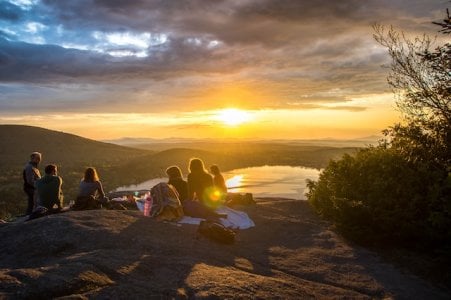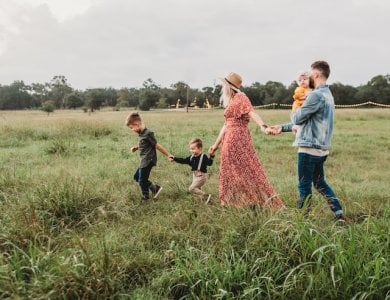Discover the shocking amount a family spent to travel around Australia for a whole year
By
Seia Ibanez
- Replies 12
Embarking on a year-long adventure around Australia is a dream many harbour.
The idea of leaving behind the daily grind to explore the vast landscapes, stunning coastlines, and unique wildlife of our beautiful country is undeniably appealing.
But how much does such an adventure really cost?
In 2023, freelance writer Hannah Stenning and her husband decided to take the plunge. They quit their jobs, purchased a camper trailer, and set off on a grand tour of Australia with their five-year-old twins.
They left Sydney, travelled south to Tasmania, ventured up the middle of South Australia, explored the Northern Territory, and spent six months travelling down the coast of Western Australia.
Their journey was filled with unforgettable experiences.
Recalling their experience, Hannah said, ‘We jumped off waterfalls, swam with whale sharks, floated down hot springs, took helicopter rides over gorges in the Kimberley, and camped right on the beach where we lit fires in the sand, ate an embarrassment of freshly caught seafood and swam with turtles and dolphins right off the shore.’
‘We truly lived the dream!’
But such an adventure comes with a hefty price tag. Hannah shared a breakdown of their average weekly expenses:
While the prospect of forking out $10,000 monthly is truly terrifying, Hannah was quick to clarify that these costs fluctuated significantly from week to week.
‘For example, our first week in Broome cost us $680 in accommodation at the RAC Cable Beach caravan park, and our second week cost us nothing because we were free camping on the Dampier Peninsula,’ Hannah explained.
Fuel was another major expense, especially during weeks when Hannah’s family covered long distances.
‘Weeks spent travelling long distances took a big toll, with diesel costing up to $3.50 a litre in remote places and being guzzled up on the long highways,’ Hannah said.
‘Meanwhile, when we stopped for a week, the fuel bill was blissfully zero.’
Before they set off, they also had to consider the cost of their camper trailer.
‘We didn’t do what most families on the road do and buy a caravan because we didn’t want to also have to upgrade our car (a Toyota Prado) due to towing capacity,’ she said.
Hannah and her family opted for a Cub Drifter, one of the best off-road Australian-made camper trailers, which set them back about $65,000. This allowed them to access more remote areas on rougher roads, but they had to forego the luxury of an internal bathroom or inside kitchen.
So, how did they finance this extravagant adventure?
‘As much as I manifested it, unfortunately, we didn’t win the lottery,’ she uttered.
‘So, in short, we extended our mortgage, rented our house on Airbnb before we left, and then rented it long-term while we were away.’
‘Plus, we sold my car and anything else we could find of value that we didn’t need anymore .’
According to Hannah, ‘most’ of her designer dresses and their OzTent RV5 were among the things sent away to fund their trip.
They were left with $40,000 in savings, $100,000 borrowed from the bank, and a $900 weekly rent from their house.

Hannah mentioned that they met many other families on the road who were also living this dream.
Most of them owned their own homes and had either rented them out or sold them to fund their trips. Some were working occasional jobs on the road, while others used their long service leave to fund their travels.
While Hannah’s family’s adventure was undoubtedly expensive, it's important to remember that the cost of travelling to Australia can vary greatly depending on your lifestyle and choices.
‘We found most families we spoke to managed to stick to a tighter budget than we did,’ Hannah said.
‘Some, who had spent longer away, were spending just $1,100 to $1,500 a week. A lot of families stayed mostly in free camps, some had given up alcohol, and others very rarely ate out.’
Hannah noted that everyone was living their dream differently, but they were all making it happen.
‘Our bank account looks pretty sad at the moment, but we have absolutely no regrets. It’s the best thing we’ve ever done, and I don’t know if we’ll ever have a year quite like it,’ she concluded.
‘We returned with…not much money and a lot of incredible memories.’
Travelling the country or overseas can be expensive, but this shouldn’t mean that you have to sacrifice safety for the sake of savings.
A ‘really dangerous trend’ was highlighted recently, saying that new research revealed ‘some of us are definitely putting saving money ahead of our health’.
What’s this trend? Find out here.
 What are your thoughts on this, members? Have you ever considered a similar adventure? Let us know in the comments below.
What are your thoughts on this, members? Have you ever considered a similar adventure? Let us know in the comments below.
The idea of leaving behind the daily grind to explore the vast landscapes, stunning coastlines, and unique wildlife of our beautiful country is undeniably appealing.
But how much does such an adventure really cost?
In 2023, freelance writer Hannah Stenning and her husband decided to take the plunge. They quit their jobs, purchased a camper trailer, and set off on a grand tour of Australia with their five-year-old twins.
They left Sydney, travelled south to Tasmania, ventured up the middle of South Australia, explored the Northern Territory, and spent six months travelling down the coast of Western Australia.
Their journey was filled with unforgettable experiences.
Recalling their experience, Hannah said, ‘We jumped off waterfalls, swam with whale sharks, floated down hot springs, took helicopter rides over gorges in the Kimberley, and camped right on the beach where we lit fires in the sand, ate an embarrassment of freshly caught seafood and swam with turtles and dolphins right off the shore.’
‘We truly lived the dream!’
But such an adventure comes with a hefty price tag. Hannah shared a breakdown of their average weekly expenses:
- Essential bills (house, car and health insurance, council rates, phone bills): $400
- Fuel: $500
- Groceries: $400
- Alcohol: $70
- Accommodation (campground fees): $280
- Eating out and takeaway food and coffee: $300
- Experiences (e.g. swimming with whale sharks): $300
- Miscellaneous (e.g. repairs, fishing tackle, clothing): $250
While the prospect of forking out $10,000 monthly is truly terrifying, Hannah was quick to clarify that these costs fluctuated significantly from week to week.
‘For example, our first week in Broome cost us $680 in accommodation at the RAC Cable Beach caravan park, and our second week cost us nothing because we were free camping on the Dampier Peninsula,’ Hannah explained.
Fuel was another major expense, especially during weeks when Hannah’s family covered long distances.
‘Weeks spent travelling long distances took a big toll, with diesel costing up to $3.50 a litre in remote places and being guzzled up on the long highways,’ Hannah said.
‘Meanwhile, when we stopped for a week, the fuel bill was blissfully zero.’
Before they set off, they also had to consider the cost of their camper trailer.
‘We didn’t do what most families on the road do and buy a caravan because we didn’t want to also have to upgrade our car (a Toyota Prado) due to towing capacity,’ she said.
Hannah and her family opted for a Cub Drifter, one of the best off-road Australian-made camper trailers, which set them back about $65,000. This allowed them to access more remote areas on rougher roads, but they had to forego the luxury of an internal bathroom or inside kitchen.
So, how did they finance this extravagant adventure?
‘As much as I manifested it, unfortunately, we didn’t win the lottery,’ she uttered.
‘So, in short, we extended our mortgage, rented our house on Airbnb before we left, and then rented it long-term while we were away.’
‘Plus, we sold my car and anything else we could find of value that we didn’t need anymore .’
According to Hannah, ‘most’ of her designer dresses and their OzTent RV5 were among the things sent away to fund their trip.
They were left with $40,000 in savings, $100,000 borrowed from the bank, and a $900 weekly rent from their house.

While the adventure may be expensive, Hannah and her family gained a lot of memories. Credit: Unsplash
Hannah mentioned that they met many other families on the road who were also living this dream.
Most of them owned their own homes and had either rented them out or sold them to fund their trips. Some were working occasional jobs on the road, while others used their long service leave to fund their travels.
While Hannah’s family’s adventure was undoubtedly expensive, it's important to remember that the cost of travelling to Australia can vary greatly depending on your lifestyle and choices.
‘We found most families we spoke to managed to stick to a tighter budget than we did,’ Hannah said.
‘Some, who had spent longer away, were spending just $1,100 to $1,500 a week. A lot of families stayed mostly in free camps, some had given up alcohol, and others very rarely ate out.’
Hannah noted that everyone was living their dream differently, but they were all making it happen.
‘Our bank account looks pretty sad at the moment, but we have absolutely no regrets. It’s the best thing we’ve ever done, and I don’t know if we’ll ever have a year quite like it,’ she concluded.
‘We returned with…not much money and a lot of incredible memories.’
Travelling the country or overseas can be expensive, but this shouldn’t mean that you have to sacrifice safety for the sake of savings.
A ‘really dangerous trend’ was highlighted recently, saying that new research revealed ‘some of us are definitely putting saving money ahead of our health’.
What’s this trend? Find out here.
Key Takeaways
- Hannah Stenning and her husband embarked on a year-long journey around Australia with their twins, involving numerous outdoor activities and experiences.
- The weekly expenses for their trip averaged $2,500, with costs including insurance, fuel, groceries, accommodation, and leisure activities.
- To finance their adventure, they extended their mortgage, rented their house, sold assets, and used savings and loan funds.
- Despite returning with little money, the couple has no regrets about their travels and found that many families they met had various ways of budgeting to afford their trips.








